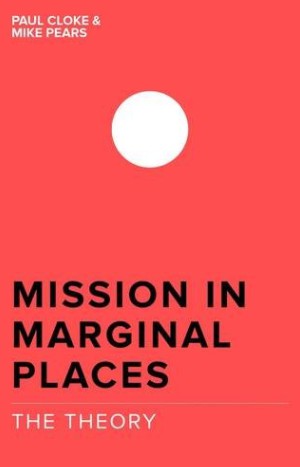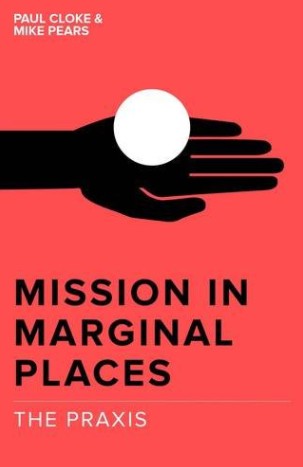Mission in Marginal Places
Encouraging start to a series looking at mission in marginal places, with some questions for what's to follow
 Mission In Marginal Places: The Theory
Mission In Marginal Places: The Theory
Mission in Marginal Places: The Praxis
Cloke, P., & Pears, M. (Eds.)
Carlisle: Paternoster
ISBN: 978-1842279106 and 978-1842279090
Reviewed by Glen Marshall
It’s good to welcome the first two books in a series looking at mission in marginal places. Mike Pears is a Baptist practitioner and theorist of urban mission fresh from his PhD in the theology and ethnography of place. He is the director of Urban Life. Paul Cloke is Professor of Human Geography at the University of Exeter and a member of a Vineyard Church.
The series promises to work with three key convictions about Christian mission: it must prioritise those who live on the margins; it must be rooted in and reflect theologically upon real-life engagement in a variety of contexts; it must be informed by dialogue with the social sciences. It is also the intention of the series to take seriously the spirituality of those engaged in such mission and the spiritual dimension of the places in which they minister. Sounds promising.
The book on theory is divided into three parts: mission and marginality – those places at a distance from centres of political power and adrift from the cultural mainstream; mission and “the other” – those people who are unlike us and therefore all too easily stereotyped, misunderstood or ignored; mission and God – the kind of communities we need to be if we are to reflect the God of the cross, the God of peace and the God of hope.
The discussion engages with important missiological themes such as incarnation, community, hospitality, dialogue, witness, contextualization, secularisation, partnership, identity, sacrifice, spirituality and justice. Important stuff this, but what makes this book, and hopefully the series as a whole, a distinctive voice is the engagement with human geography in general and the geography of place in particular.
Missiology is at its best when it draws not only on its own rich tradition but also on conversation with other fields of learning. Over the years familiar conversation partners have included, sociology, anthropology and cultural studies. It will be interesting to see if dialogue with human geography offers up helpful new insights.
The early signs are promising. While the importance of careful ethnography (strongly advocated by Cloke and Pears) is not at all new to missiology, a serious attention to the multiple dimensions of place – the built environment, a sense of place, the spirituality of place, the nature of public place – looks like it might have potential to enrich our reflection and our practice.
 The book on praxis seeks to exemplify the methodology advocated in the book on theory. Each of the five main sections looks at one particular realm of life – economic, political, social, environmental and creative – and combines reflection and short case studies in an attempt generate bottom up insights into the nature of Christian mission in each of these realms. As with the book on theory each section ends with a helpful editorial reflection in which Cloke and Pears try to tie the insights of the other contributors back into the overall theme of the series.
The book on praxis seeks to exemplify the methodology advocated in the book on theory. Each of the five main sections looks at one particular realm of life – economic, political, social, environmental and creative – and combines reflection and short case studies in an attempt generate bottom up insights into the nature of Christian mission in each of these realms. As with the book on theory each section ends with a helpful editorial reflection in which Cloke and Pears try to tie the insights of the other contributors back into the overall theme of the series.
So, as I say, a welcome and encouraging start to the series. In addition to the overall aims of the series particularly appreciated:
- The rich bibliographic trails laid at the end of most of the chapters.
- The engagement with serious thinkers both Christian and secular, including Bevans, Girard, Habermas, Schroeder and Volf.
- The good number of contributions from Baptists – at least in the book on theory.
Inevitably I also had a number of hesitations, questions and disappointments:
I wonder to whom the books are addressed. While I will certainly use these books in my own teaching, the style of much of the writing is overly academic and too jargon strewn to be easily accessible to those who most need to hear the core messages of the series. Is there room for a volume aimed at the non-specialist reader?
There wasn’t any serious engagement with those who argue that mission must take into account not just place but also networks and flows. I was surprised for example there was no reflection on the thinking of Manuel Castells.
There wasn’t enough consideration of or engagement with other religious traditions which are surely of major importance when thinking of marginalization and “the other.”
There needs to be more serious consideration of the challenge maintaining a distinctive Christian identity while being genuinely open to the insights of others who both shape and inhabit the places where mission happens.
A more serious treatment of the pace of intentional evangelism as part of Christian mission in marginal places would be welcome.
There was a tendency to equate marginalization with the urban and to give little more than a passing nod to rural forms of marginalization.
All the 17 contributors are white and only four are women. This is surely particularly problematic for a project that stresses the importance of engaging with the lived experiences of “the other” and the marginalized.
Perhaps some of these concerns will be addressed in forthcoming volumes.
Glen Marshall is Co-Principal of Northern Baptist College
Mission in Marginal Places: the Theory, the Praxis and The Stories are available from our online shop.
Baptist Times, 11/02/2017